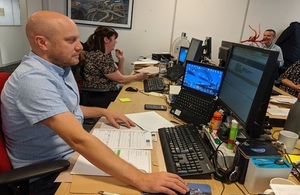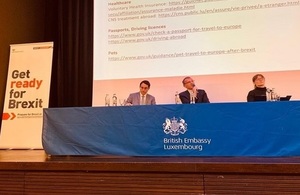Good morning.
It’s great to be able to join you today through the wonders of modern technology. And if this call cuts out it’s probably due to the patchy wifi in Westminster rather than a failure with the tech.
The Commons isn’t the most dynamic, fast-moving place – as you may have noticed.
I’m delighted to have the opportunity to speak with you today because, even amid everything that’s going on here, some things are more important than Brexit. Things like the NHS. Things like primary care.
Primary care is the foundation of the health service in this country, which means GPs are the bedrock of the NHS.
And, I’d like to briefly talk about 3 things that, I believe, are fundamental to getting that foundation right.
Number 1: people.
Number 2: structure.
And 3: tech.
I’ll take each in turn.
First: people.
There are over 3 times as many doctors working in hospitals than there are doctors in general practice. And yet, last year, there were nearly 15 times as many GP visits as there were hospital admissions.
Clearly, there’s a disconnect between those figures. And of course acuity is higher in hospitals. But the number of hospital doctors has gone up much faster than GPs.
More than a million appointments a day now happen in general practice, but, historically, we haven’t prioritised general practice enough.
It’s absolutely vital we get more people into general practice: we need to recruit more, we need to retain more, we need to make the perception, and reality, of being a GP as prestigious as any specialism.
So I’m delighted that the latest Health Education England figures for GP recruitment, published this week, show that 3,538 doctors have accepted a place on GP speciality training this year – the highest ever number in history.
This builds on the record numbers we recruited last year. And the 250 more full-time equivalent doctors we have working in general practice this year.
We need to go further and faster, and remain committed to recruiting 5,000 more GPs.
We have started to recruit an additional 20,000 clinical staff to support GPs in primary care within the next 5 years.
There’s more money going into primary and community care: £4.5 billion extra each year by 2023 to 2024 – funding increasing faster for primary care than the NHS as a whole. Because we know there are staffing challenges and it’s critical we address those challenges to build a sustainable NHS.
So that means building on our recruitment success, and addressing the underlying issues that affect retention: workload, pensions, pay, training. Doing everything we can to help experienced GPs stay on, or back into, the profession.
Second: structure.
I like to use this analogy: previously, many GPs were like soloists, or perhaps a string quartet – brilliant individual musicians.
But now, and increasingly in the future, you’re going to be more like the conductor of an orchestra. Pulling together a team of specialists to produce something more than the sum of its parts.
So your specialist skill is still going to be vital to the delivery of primary care, but you’re also going to need another set of skills as primary care networks and multi-disciplinary teams expand.
Expanding your clinical skills, and developing your leadership skills.
And we have to ensure that leaders not only have the right numbers of people, but also the right structures in place to succeed.
We launched the landmark Clinical Negligence Scheme for General Practice in April.
And we’re doing more to help you limit personal liabilities, reduce risk, and work in bigger teams.
We want to make it easier for GP practises to become mutuals.
And we’re bringing forward a range of recommendations in the Partnership Review to make your lives easier.
Structure also means addressing the outdated practice preventing GPs from being listed on the General Medical Council’s (GMC) specialist register. It’s not right, and it doesn’t reflect the increasingly important role GPs are going to play in the delivery of personalised, preventative healthcare in the future.
We will work with the GMC to change this and include GPs on the specialist register at the earliest opportunity.
But structure is also about process.
When I’ve seen practices and networks of similar sizes and similar demographics, the striking difference between the ones performing really well, and the ones who aren’t performing as well, is the processes they have in place.
By changing the process, you can improve performance.
Just to give you one example I saw at the Quorn Medical Centre in Loughborough.
Their telephone triage system is excellent. Patients can get a same-day telephone appointment, and if appropriate, they’ll be asked to come to the surgery, or directed to a pharmacist, or other primary or secondary care.
And the reason it works so well is because they have one of their most experienced GPs on the telephone triage system.
So many surgeries use their most junior staff, often the receptionist. But an effective and efficient triage system can make an enormous difference to access, and that’s what matters most to people: feeling like you can speak to your GP when you need it.
And this a 150-year-old technology we’re talking about – even Jacob Rees-Mogg has one.
Informed by the access review, we will enable the spread of best practice to support practices and networks. Many will receive targeted support to help them adopt new ways of working, to free up time to improve access, and to implement best triage.
This will build on the good work already done by the Time for Care programme. That has already supported practices to free up more than half a million hours of time for patients.
Which brings me to the third, and final, thing I’d like to talk about today: tech.
Tech is our friend.
It’s allowing me to speak to you now. It’s going to transform the delivery of primary care.
And it isn’t about replacing people, it’s about enhancing what trained, skilled, experienced professionals can do.
So let me paint you a picture: you’re a GP, you’re also a parent, you’re balancing work and childcare, like so many people do.
Using the tech of today, you can do video consultations, from your own home, after dropping the children off at school. You can advise, prescribe and book a patient in with a colleague at your GP surgery or primary care network.
Tomorrow, it may be other way around, with you at the surgery, and your colleague working from home.
Modern tech, allows for modern ways of working and living. It helps with recruitment and retention. And, above all, it means we improve access for patients.
People get frustrated by the lack of access, not just by the lack of appointments. At the moment, physical appointments are often the only way to get access, but as we expand phone and video, there’s so much more we can do to help you do your jobs, and get the very best out of each and every one of our 44,570 GPs.
So digitising paper records, real-time and secure access to records for GPs and patients, IT infrastructure that works, inter-operable systems as standard, electronic prescribing to complement the millions of people now accessing GP services digitally – getting all of this tech right so we can deliver better care for people.
That’s what all of us want.
And, I’d just like to end by paying tribute to someone, who has done so much to improve primary care, both for staff and patients: Helen Stokes-Lampard.
She’s done a wonderful job as chair, and I would say I’m sorry to see her go, but she’s only going as far as the new National Academy for Social Prescribing, where she’ll still be championing general practice and leading the way on social prescribing.
So thank you, Helen, for your fantastic contribution, and I’d like to welcome Martin Marshall to this vital role.
I look forward to working with you because general practice has always been, and always will be, the bedrock of the NHS.
Thank you.

